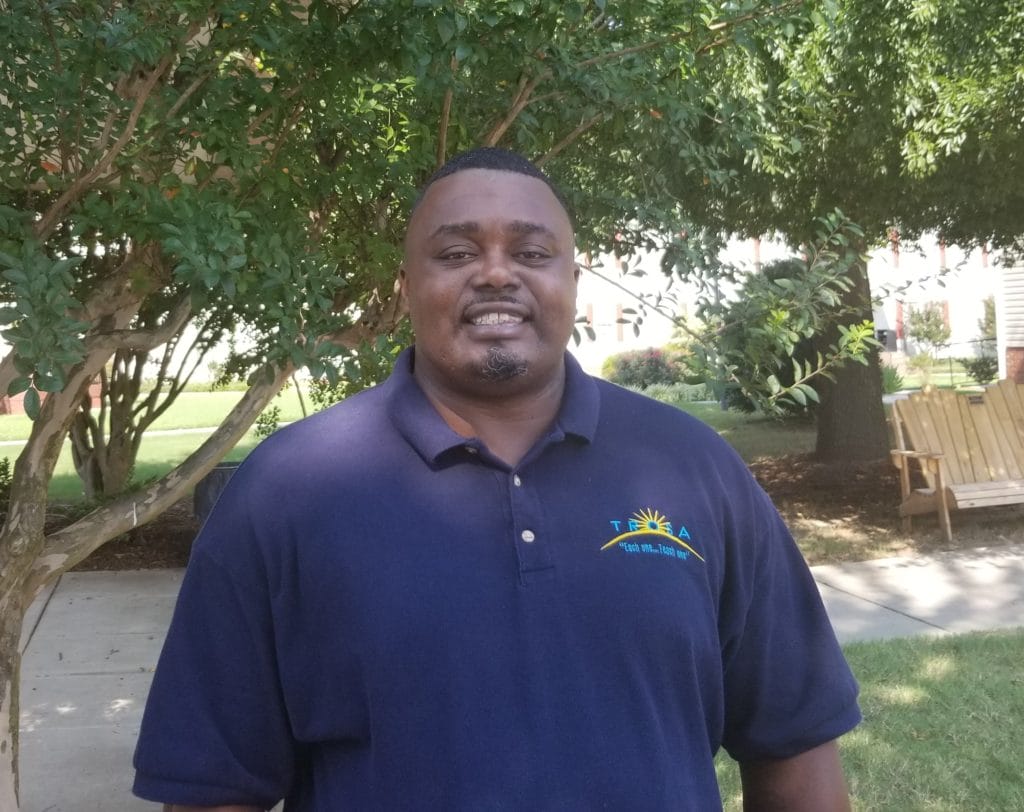Dymont started using drugs when he was 15. Today, he is a TROSA graduate who has changed his life. “For a long time, I struggled with the hand I was dealt,” says Dymont. “That’s not the case anymore. I care about people. I want to help people. I strive to be a better person every day. How I feel now is something that I never thought could happen…but it’s amazing!”
Growing up in a single-parent household with two younger brothers, Dymont describes his childhood as “rough.”
“My mother always tried her best…trying to take care of three little boys and trying to be a mother and father figure. I got kind of rebellious and I was always getting into trouble.” He started hanging out with the wrong crowd. Instead of spending time at home, he spent a lot of time on the streets and began using drugs…alcohol and marijuana, and then cocaine. Dymont joined a gang and was eventually kicked out of school for fighting.
At age 18, Dymont spent 18 months in prison…then at age 24, he spent just over five years in prison. After getting out of prison the second time, Dymont sought help at a treatment program while he was on parole. He stayed in treatment for nine months, but started using again. Dymont fell back into old patterns and was sent to jail.
After getting out of jail, Dymont found himself homeless. His family showed him they had had enough: “My mother locked her door. She wouldn’t let me in. I called my uncle and he gave me TROSA’s number.” Dymont called, interviewed, and started TROSA’s two-year program in April 2018.
“I never got lucky enough to get the chance to do the right thing. It was always one bad thing after another bad thing,” says Dymont. “When I heard about TROSA and they accepted me, I wanted to do whatever I could to save my life.” Today, Dymont is serving as a role model for hundreds of residents, showing them that they, too, can proudly lead a life of purpose and achievement.
At TROSA, residents participate in various community assignments that provide vocational training and help develop life skills such as communication, teamwork, leadership, and conflict resolution. For the majority of Dymont’s program, he assisted TROSA’s Men’s Program.
Dymont took advantage of all that TROSA has to offer. He took a welding class at Durham Technical Community College; he earned his North Carolina Peer Support Specialist certification; and he got his driver’s license back with TROSA’s help. In addition, he’s had dental work done at TROSA, all at no charge.
For Dymont, a life in recovery means getting excited about things that others may take for granted. “Before, my life was chaos,” says Dymont. “I was always using, always in the streets. Now I’m just able to enjoy life and do the ‘normal’ things, like being able to walk down the street and go to the store.”
Dymont completed TROSA’s two-year program and applied to stay longer in TROSA’s program as a “post-graduate,” which is someone who applies to stay on after graduating to serve as a role model and mentor in TROSA’s community while continuing to receive comprehensive treatment. In 2021, Dymont became a staff member at TROSA, serving as a Residential House Manager. In addition to administrative support for the Men’s Program, Dymont helps facilitate classes and supports the newest male residents at TROSA.
“The guys who just arrive at TROSA may be people from prison, people who have been in gangs […] people who have been traumatized,” says Dymont. “I’ve been through the worst in my life, and I am an example that it’s possible to do the right thing and have a better life.”
For Dymont, it’s about giving back:
“I want to continue to be an example for the residents here and to help people. For anyone who comes here to try to change their life…I want to show them that it’s possible. I just thought I had a drug problem, but I didn’t realize it was deeper than that. People here helped me. Now, I want to help others. That’s what it’s all about. And my family is proud of me. Today, I see my mother smile…I can’t put into words how amazing that feels.”

